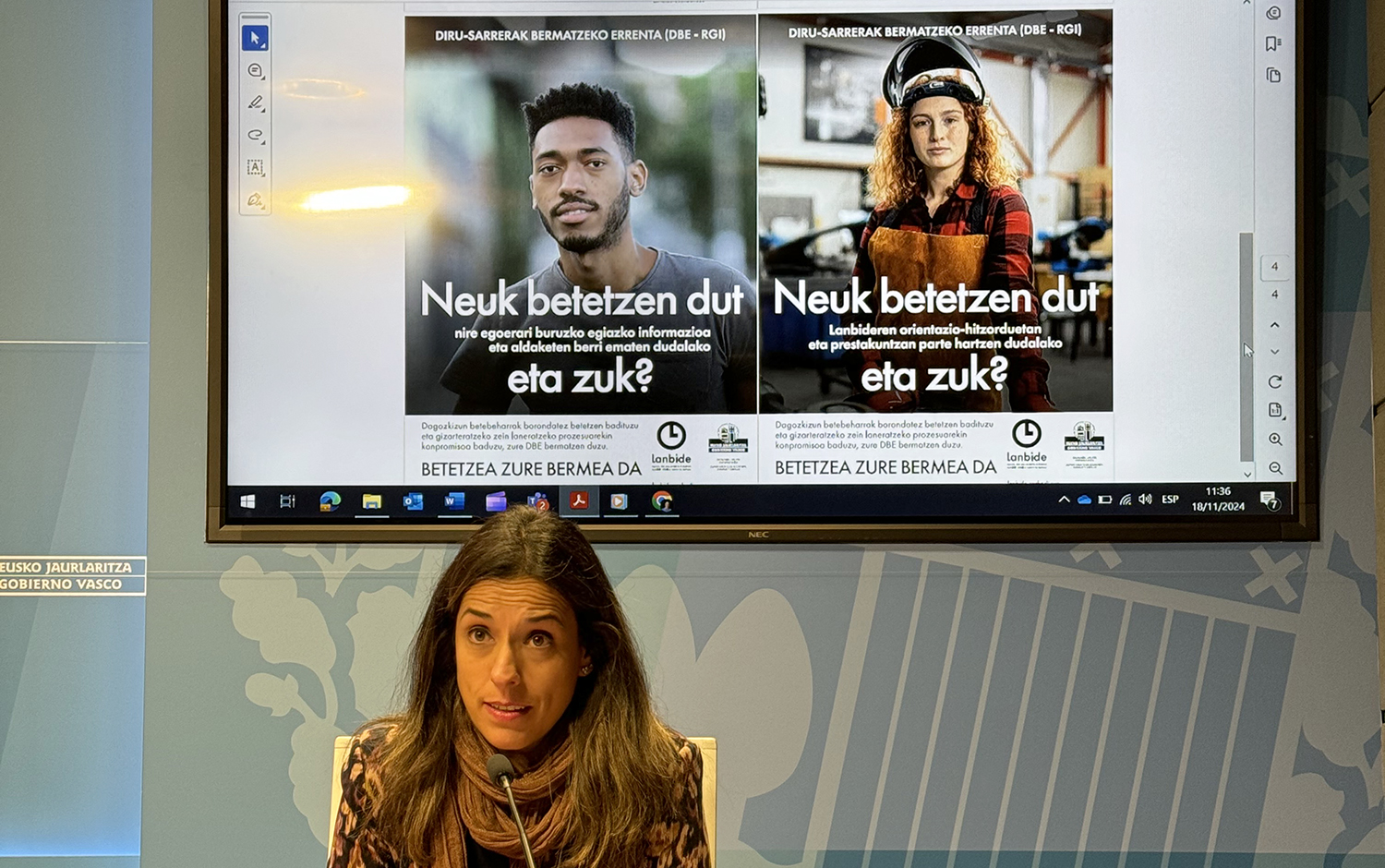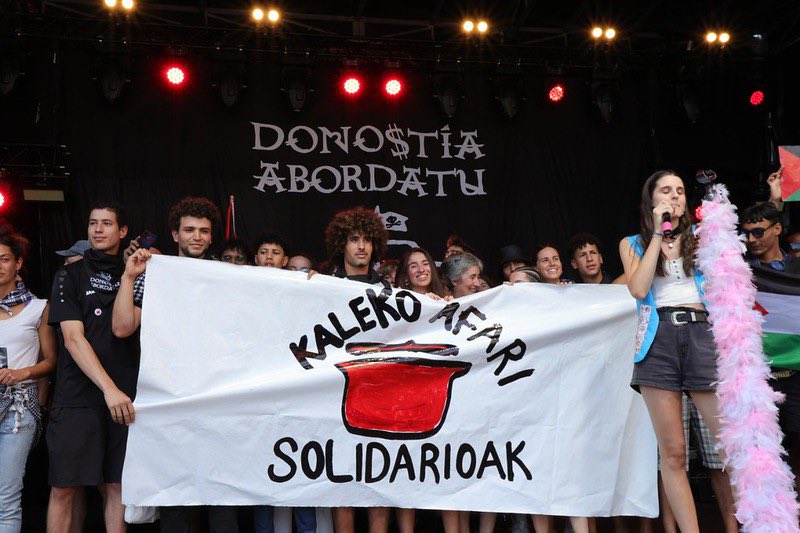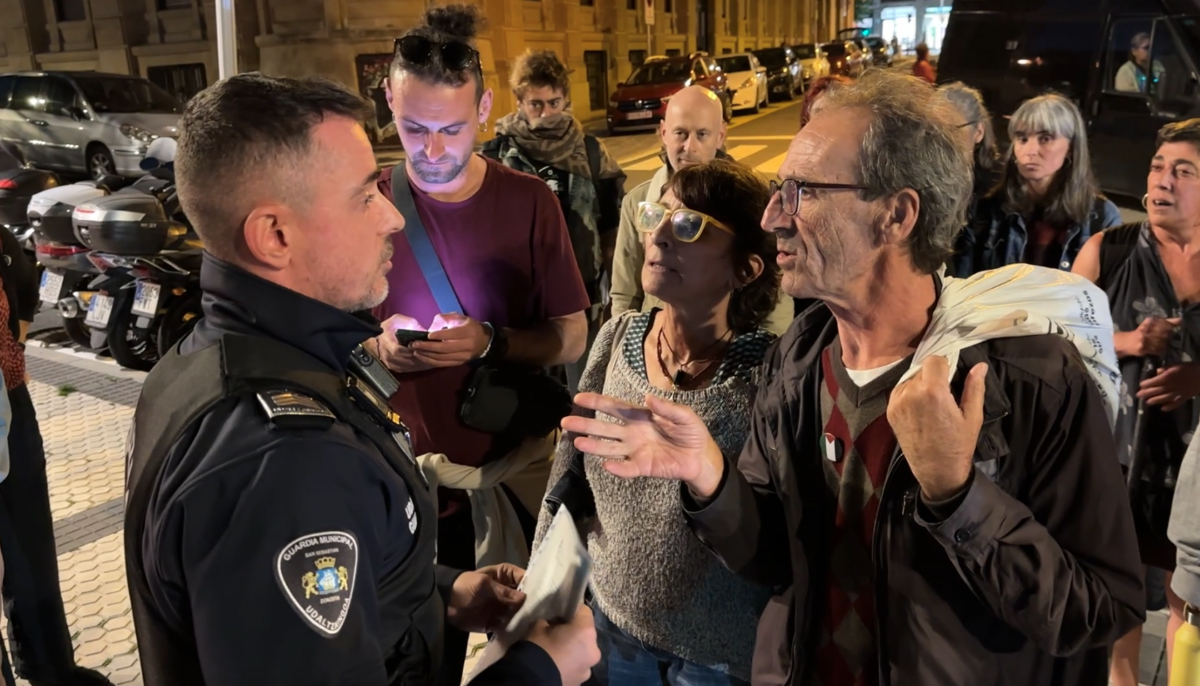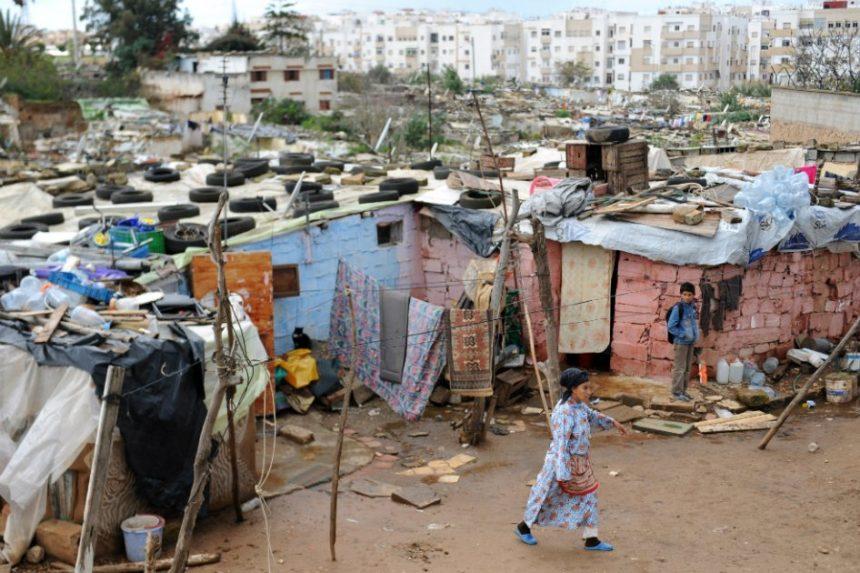Comfortable rich, poor in sea bass
- The Income Guarantee Aid (AGI) may no longer be applied for in Gipuzkoa from 1 July – in the case of having children, the period shall be extended until 31 December. The Member says that this economic benefit neither serves nor has it eliminated social integration, but the players in the sector consider that a minimum subsistence income and inclusive policies are complementary, that one does not interfere in the other, but quite the opposite. Caritas makes it clear: “The aids that are not granted are the ones that do not help.”
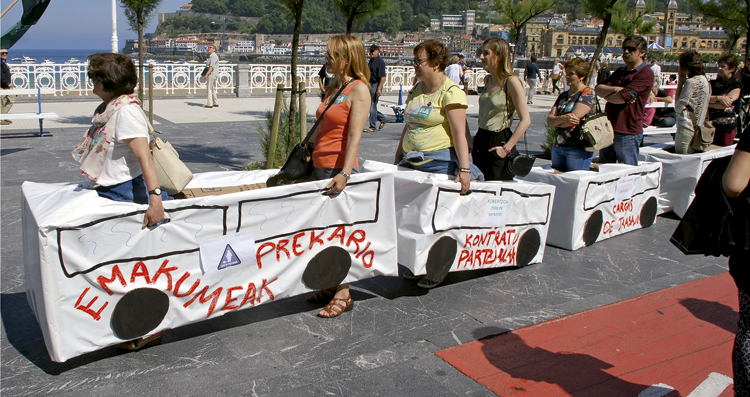
Before entering the debate, let us put the data on the table: 1,371 families receive this aid in Gipuzkoa; in addition to serving as a support for these families, it supports about 500 jobs – as a stimulus to increase the consumption of proximity – and the Representative allocates some EUR 11 million to this benefit, i.e. with a budget of 813 million, less than 1.4% of the budget. All this when the situation of poverty and exclusion is increasing: Between 2012 and 2014, poverty has increased by 50% in the CAV, and currently, more than 20% of the population lives at risk of poverty and exclusion.
It all started by cutting CAV's Income Guarantee Income
Income Guarantee Income (IGR) in the CAV is one of the many times recognized by politicians, who consider it an effective tool for social protection and the eradication of poverty. Well, in 2011 the Basque Government decided to tighten the requirements for access to the IGR, which went from asking for a year of registration to having to be registered at least three years in the CAV, and cut the amount of income by 7%. The answer to these cuts was the subsidy from Gipuzkoa, when he ruled EH-Bildu in the Deputation: It was an alternative to cover people who were unprotected in the period between 1 and 3 years, that is, a one-year registration was requested to be able to access the benefit in Gipuzkoa and not three years.
Alfonso López Martínez:
“We need fairer and more progressive taxation, a more balanced way of redistributing wealth. There is no economic development without social development, that is proven”
The social partners are clear about what is best: The reversal of the IGR at least to the first, so that all citizens of the CAV have the right rights and support, something that the Basque Government has not done since 2011 and that the Council has also removed the patch they had in Gipuzkoa. The unions have opposed the decision, the Official College of Social Workers in Gipuzkoa, and have strongly denounced several members of the Caritas, stressing that the action is “very serious”, “painful” and “the lack of ethical commitment and justice to the poor”: “Here we see that we live in the culture of exclusion”. The African Union of Gipuzkoa is also critical: “They are playing with the lives of many families.” In addition, this type of benefit is essential for coexistence and to avoid social conflict: “Basic income avoids situations that may incite theft or similar acts. Who does not have the money to survive and does not get a job, what is he going to do, will starve himself to death?”
“The Council of Gipuzkoa needs money, blocks budgets and does so at the expense of the poor, because the poor do not vote, because they have less political participation than the rich, and often because of their administrative situation they cannot defend themselves,” says Ander Rodríguez Lejarza. The former Social Policy Advisor who imposed the benefit is him. We have also asked the current councillor, Maite Peña, for the reasons for the withdrawal of the aid, but he did not answer us; from his department they have told us that he does not want confrontation. We have also proposed to you to talk about the social policy that is going to be put in place for the future, but you have told us that it is still indefinite. However, the arguments for the withdrawal of the aid were put forward at a public hearing. Let's go step by step.
Homogeneity? From the best to the worst
Peña has stated that this benefit has made Gipuzkoa an "island" and that the aid must be given "in a homogeneous way" throughout the territory. The unitary model would be the best, yes, but, as has been said, the conditions of the GI in the CAV deteriorated, and remained. For this reason, Alfonso López Martínez, representative of the European Network for the Fight against Poverty and Social Exclusion in the Basque Country, has called for the need to improve the IGR so that the citizens who have been left out can re-enter the protection system while hardening the conditions.
Ander Rodríguez Lejarza:
“Do you steal fish from him to give him the reed? To socialize, one must first ensure a dignified life”
However, in the name of this homogeneity, there is a singular paradox: In Bizkaia and Álava, social benefits cover the tranche of registration from 2 and a half to 3 years, and in Gipuzkoa, once the subsidy has been eliminated, the registered persons under 3 years of age – can receive RGI from 3 years of age – will be left uncovered. Therefore, Gipuzkoa will move from offering a subsidy with the best conditions to offering worse conditions than the other territories of the CAV.
Rodriguez sees neither feet nor heads in the argument: “Is the Council going to do the same with aid for dependency? Does Gipuzkoa apply criteria that are not applied in either Bizkaia or Álava? Other services also offer better coverage in Gipuzkoa, will it be homogenized for bad?”
“Artificial migration”, a message as dangerous as cheat
Peña has also argued that this Gipuzkoan aid has caused "an artificial migratory flow", in which the "pull effect" has been mentioned. However, more than the increase in migration, many people of foreign origin already living there have exercised the option – right – as the one-year registration was sufficient. Currently, the percentage of people of foreign nationality outside the Spanish State is 6.5% in Gipuzkoa, below Álava and Navarre. Of course, people prefer a society that offers the best living and working conditions, a reflection of a healthy society, that guarantees the rights and needs of all citizens. “We do not understand anything,” they say from the African Association, “they are full of their mouths, they are ready to welcome the Syrian refugees, but then they want to throw the immigrants who are there?” For the members of Caritas, “many times, our solidarity is pure appearance.” And for Rodríguez Lejarza, “what strikes the crisis the most are the poor and the immigrants, and they themselves are punishing the public crisis response system: they are twice victims. Let's go to the same thing. Why have they put this collective in the spotlight? Because many do not have the right to vote, and when they do, fewer are going to vote.”
Socializing, a great challenge
Peña has added that basic support generates chronic dependency and does not serve to socialize and advance in improving the quality of life of citizens. Regaining the metaphor of the MEP, Markel Olano, it is necessary to decide “what to give to the person who needs it”, “fish or cane, and we believe that the cane is better”. In this sense, the Representative has presented the Elkar-Ekin program, which mainly includes “more places in residences for people at risk of exclusion and specific training for employment, language courses and a social and solidarity economy that generates employment”.
Alfonso López Martínez:
“The level of concern generated by many politicians and the media makes no sense; it seems that the country is going to sink because of the IGR, and it accounts for only 4.5% of the government budget”
However, Rodríguez Lejarza is surprised: “Do you steal fish from him to give him the reed? For the development of autonomous projects, is it not advisable to eat in advance? For social inclusion, we must first guarantee a dignified life, and we from EH-Bildu have proposed re-integration measures complementary to the subsidy. It is absolutely false to propose aid and inclusion as opposed: they are parallel routes that, according to the cases, do not have to go together, because not all people in poverty suffer exclusion, exclusion not only has to do with income, it is multidimensional and has to do with their participation in society, with their capacities in the labor market...”
Ensuring assistance and strengthening preventive policies is the right binomial, according to social science expert Joseba Zalakain: “Not only in redistributive policies, but also in pre-distributive policies, it is necessary to adapt education, the labor market and the field of housing to generate less poverty”.
Income Guarantee Income, in the middle of the debate
First of all, again the data. The IGR is perceived in the CAV by 65,657 inhabitants, of whom two in three are Spanish nationals and more than half are women. About 4.5% of the Basque Government budget is earmarked for this income and, in addition to ensuring a minimum income for these citizens, it is estimated that it also serves to maintain some 26,000 jobs. As will be analysed below, the data also show that employment does not guarantee the exit from the poverty situation: since last year there has been a decline in unemployment in the VOC and an increase in income.
The IGR is currently being examined by a technical committee and the debate on it is on the table. Far from the demagogic line of a few politicians – the PP remains committed to tightening the conditions to receive the IGR by pulling the rope that Javier Maroto put in place, demanding a registration of at least five years and demanding the exclusion of migrants in an irregular situation – the social agents see the need to improve three main points: Restoring the IGR to the above conditions, placing emphasis on social integration and the role of social services, and removing basic income from the logic of the current labour market.
With regard to the first point, in addition to reducing the demand for a census to one year and again increasing the amount by 7%, the anti-poverty activist Alfonso López has also raised the need for changes such as reviewing the amount according to the children – now, from the second child, no matter how three, four or five children, the amount of money is the same – and simplifying the procedure, as it is very complex to request the benefit. Currently, about 30% of the citizens entitled to this income do not receive it, being the main causes the stigma and humiliation generated by misinformation and procedure in some of them. “We see people begging down the street, but why are they asking? Have you ever wondered? I do, and I have been told that they find a wall in the administration, that instead of giving them facilities, they put obstacles in their way. And those people should not be on the streets, but at work or in some course, or do another way for integration… The collaborating society should intervene there,” they say from the African association of Gipuzkoa.
Ander Rodríguez Lejarza:
“The road is a society that goes towards universal basic income. Resistance would be like being a box that would give the means to not access any job under any circumstance”
This brings us to the second point: The CAPV recognizes two rights to citizenship, the right to a decent income and social inclusion, and this second area is not adequately fulfilled. An important step would be that, instead of concentrating all management in Lanbide – and rather than being purely administrative – as was the case at the time, cases with a specific profile, such as those at risk of exclusion, should return to social services. “After all, in addition to providing a basic subsidy, we must also guide the community development of citizenship (its relationship with the environment and others, its social role, its role in the community…),” explains Lopez. Social services are an aid to the integration of citizenship into the environment, but they are great strangers to public services. We should make them known and give them courage.”
And having a job when it's not a guarantee of anything?
The interviewees expressed a third concern: social benefits are closely linked to contract employment; or the alternative is often precarious employment with low quality or benefit. Can people be required to do any kind of work in any condition? In an increasingly precarious labour market, the current scheme obliges citizens to accept jobs that do not help them out of poverty, arguing that they cannot rely on subsidies. In Gipuzkoa, wages have been precarious by 6% among those earning 1,100 euros or less, while in the CAV the percentage of workers is lower than the poverty threshold.
According to the sociologist of the UPV/EHU Imanol Zubero, the IGR must be differentiated from wage employment: “An increasingly irregular, unstable and precarious labour market makes this connection objectively impossible. It condemns failure.” In other words, it condemns some to precarious work for a lifetime. Furthermore, as the labour market is organised, it is nothing to include all citizens.
“If there is money – López has pointed out – money is created, but the way we distribute that wealth does not work and is increasingly concentrated in fewer hands. We would need fairer and more progressive taxation, a more balanced way of redistributing wealth. In northern Europe, for example, they have a good economic system linked to a good social protection system: there is no economic development without social development, that is demonstrated.” On the contrary, the Provincial Council of Gipuzkoa has reformed the tax on big fortunes so that the rich pay less.
The distinction between social benefits and the right of all citizens to access a basic income is discussed in countries such as Finland, the Netherlands, Germany or Switzerland, among others. Rodríguez Lejarza believes that is the way forward: “The road is a society that goes beyond the centrality of wage employment towards universal basic income. Being guaranteed a minimum income to develop your life project; and your life project may consist of devoting part of the time to paid employment (by the way, reducing working hours to give choice to more people), other hours (or a lifetime) to care, volunteering… It would be like having a resilience fund that, like the ELA union, would provide resources to not access any employment in any condition”. The labour market review would also help: LAB claims 35 hours of work and a minimum wage of EUR 1,200 for each working day in the Foral Community. Temporary contracts are also the daily bread.
Embark on the discourse, the triumph of the elite
Since the crisis, there has been a proliferation of messages that respond to certain interests in relation to social aid: that they are growing excessively – although everyone who is entitled is going to receive the benefit is a subjective right – that there is a great deal of fraud – although the fraud is 0.3%, much lower than what is done in the Treasury – that immigrants come to live from the subsidies – even if both the migration data and the economic input data they make do not lie. López says that the debate is completely embarrassed: “To begin with, there is no point in the degree of concern that many politicians and media have generated; it seems that the country is going to sink because of the IGR, and it accounts for only 4.5% of the government’s budget.” Why is the focus on subsidies and not on the tax system that keeps the rich so wealthy? In millions of euros lost in corruption? Illegal commissions? In large infrastructures?...
Social benefits are linked to contracted employment; either they receive the benefit, or the alternative is low-quality precarious work. In the CAV, 18% of workers have a wage below the poverty line
“They want a struggle between the poor – Rodríguez added – that the poor should compete with each other. Your problem is the one you have next to you and it's poorer than you; getting people to think about it is the biggest achievement of the system in times of crisis. Don’t look up, the problem isn’t up, look down, there you have the enemy.”
However, as López has pointed out, poverty and exclusion are not the characteristics of the people who suffer them, but a structural problem, because we build societies that generate all of this. “We cannot make those who suffer from these situations guilty and responsible for their situation.” From the Association of Africans of Gipuzkoa we are recommended in these times when contribute phobia or fear and phobia are spreading to the poor: “Get down the ladder and look around, how people live, and not just immigrants, because a lot of people who live upstairs don’t know what’s down there. Remember that you have food, drink, shelter… imagine that, put yourself on the other’s skin.”

"It's your problem that you have next to you, which is poorer than you, don't look up, but down, there you have the enemy. The greatest achievement of the system in times of crisis is for people to think about it," said Rodríguez Lejarza.
Wikipedian bilatu dut hitza, eta honela ulertu dut irakurritakoa: errealitatea arrazionalizatzeko metodologia da burokrazia, errealitatea ulergarriago egingo duten kontzeptuetara murrizteko bidean. Errealitatea bera ulertzeko eta kontrolatzeko helburua du, beraz.
Munduko... [+]
Gasteizko Errotako (Koroatze) auzoan izan diren manifestazio "anonimoek" kolokan jarri dute auzokoen arteko elkarbizitza. Azalera atera dituzte ere hauetan parte hartu duten partidu politiko batzuen eta beste kide batzuen izaera faxista eta arrazista.
In this frenetic and vertiginous world in which we live, the social changes that take place little by little seem to us to be sometimes imperceptible, irrelevant or insignificant. That is not the case, however, and we have to be aware of it in order to act wisely. An example of... [+]









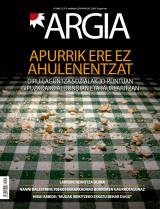


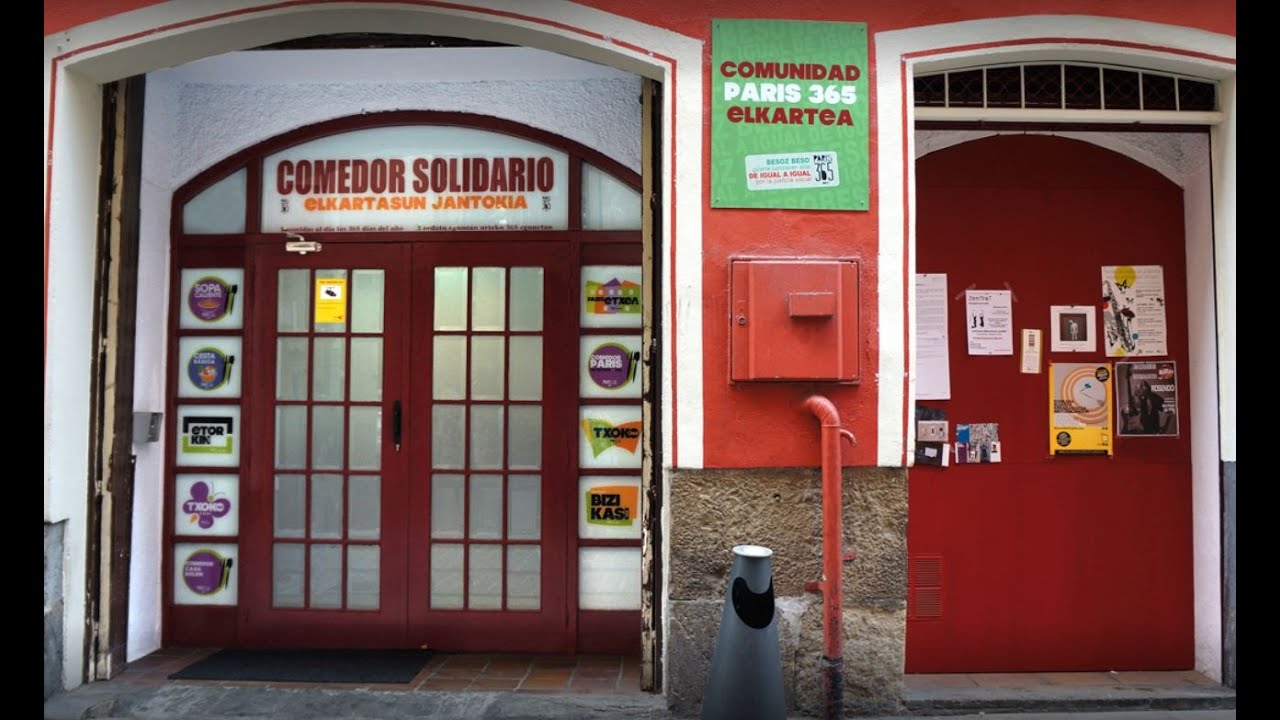

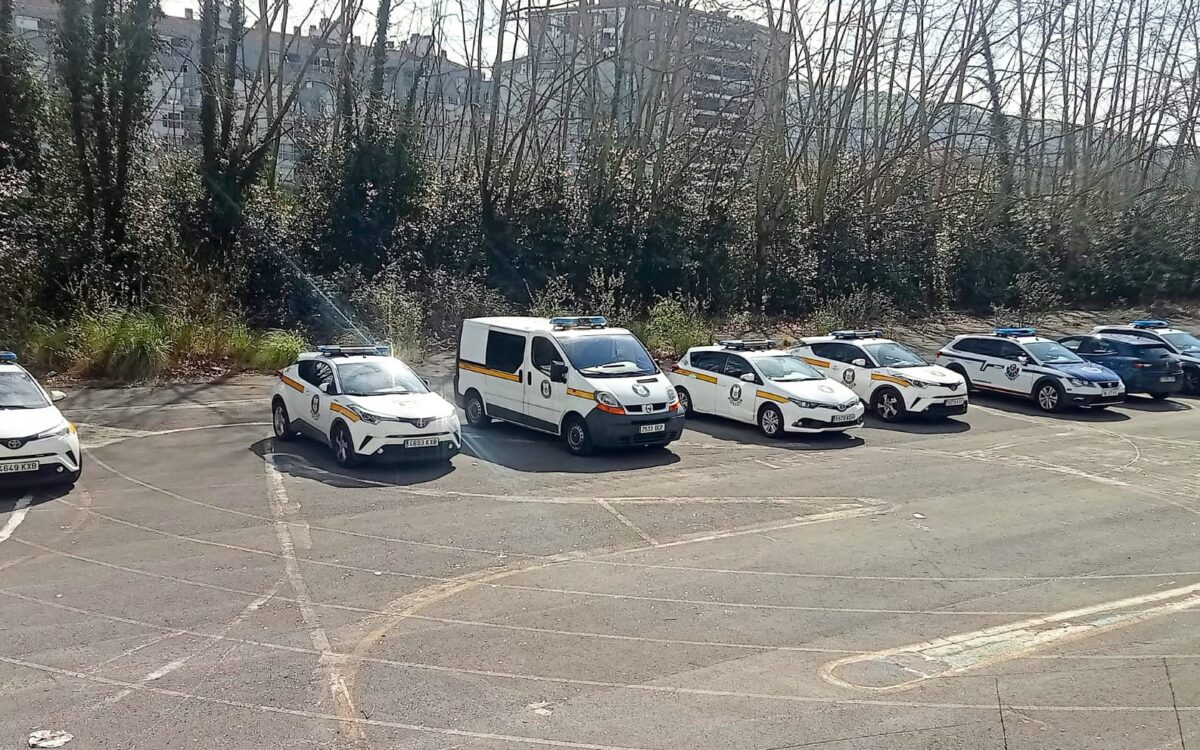

.jpeg)
